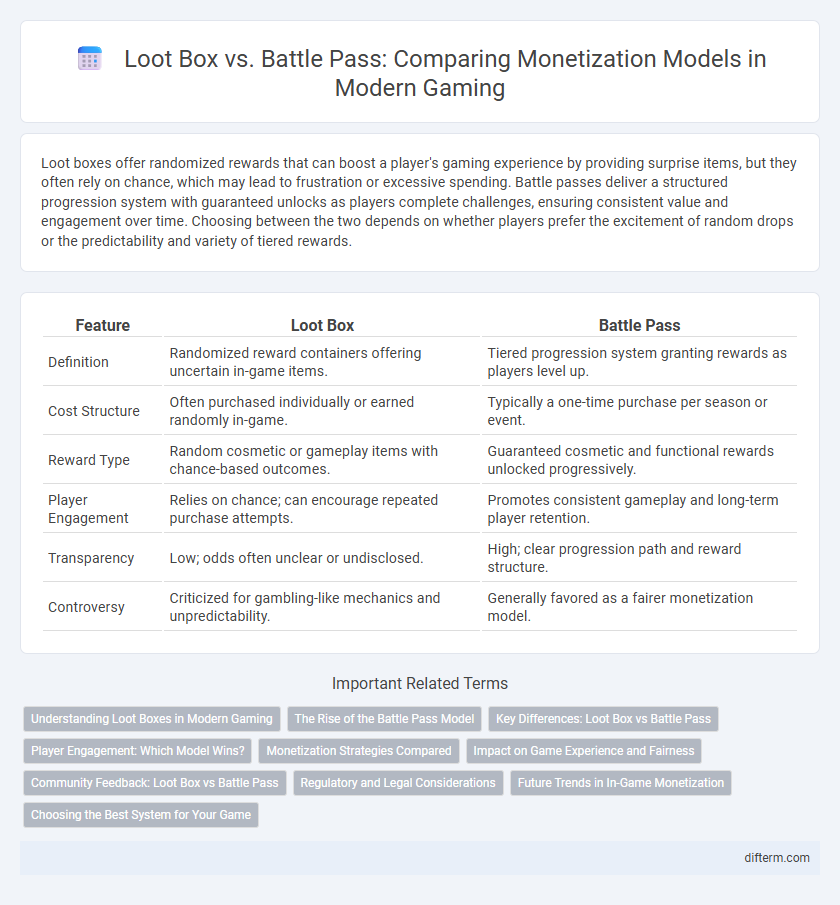Loot boxes offer randomized rewards that can boost a player's gaming experience by providing surprise items, but they often rely on chance, which may lead to frustration or excessive spending. Battle passes deliver a structured progression system with guaranteed unlocks as players complete challenges, ensuring consistent value and engagement over time. Choosing between the two depends on whether players prefer the excitement of random drops or the predictability and variety of tiered rewards.
Table of Comparison
| Feature | Loot Box | Battle Pass |
|---|---|---|
| Definition | Randomized reward containers offering uncertain in-game items. | Tiered progression system granting rewards as players level up. |
| Cost Structure | Often purchased individually or earned randomly in-game. | Typically a one-time purchase per season or event. |
| Reward Type | Random cosmetic or gameplay items with chance-based outcomes. | Guaranteed cosmetic and functional rewards unlocked progressively. |
| Player Engagement | Relies on chance; can encourage repeated purchase attempts. | Promotes consistent gameplay and long-term player retention. |
| Transparency | Low; odds often unclear or undisclosed. | High; clear progression path and reward structure. |
| Controversy | Criticized for gambling-like mechanics and unpredictability. | Generally favored as a fairer monetization model. |
Understanding Loot Boxes in Modern Gaming
Loot boxes in modern gaming are randomized rewards that players purchase or earn, often generating controversy due to their gambling-like nature and impact on player spending. Unlike battle passes, which provide a structured progression system with guaranteed rewards over time, loot boxes offer unpredictable items that can influence game balance and player satisfaction. Understanding the mechanics and player psychology behind loot boxes is essential for evaluating their role in game monetization and regulatory scrutiny.
The Rise of the Battle Pass Model
The rise of the battle pass model revolutionized in-game monetization by offering players structured progression and exclusive rewards over time, contrasting sharply with the random chance mechanics of loot boxes. Battle passes provide a transparent and skill-based approach, increasing player engagement and retention while complying with stricter regulations on gambling-like systems. Major developers like Epic Games and Activision have popularized this model, driving industry-wide shifts toward more ethical and sustainable revenue streams.
Key Differences: Loot Box vs Battle Pass
Loot boxes offer randomized rewards that create a chance-based system, while battle passes provide a structured progression with guaranteed unlocks tied to player activity. Loot boxes often rely on in-game currency or real money purchases for a chance at rare items, whereas battle passes require players to complete challenges and levels to earn rewards. The transparency of battle passes contrasts with the unpredictability of loot boxes, affecting player perception and regulatory scrutiny in gaming markets.
Player Engagement: Which Model Wins?
Battle pass models consistently generate higher player engagement by offering structured, time-limited rewards that encourage daily play and progression tracking. Loot boxes rely on randomized rewards, leading to unpredictable player motivation and often sparking controversy over pay-to-win mechanics. Data from top games shows battle pass systems increase active user retention rates by up to 30% compared to loot box reliance.
Monetization Strategies Compared
Loot boxes rely on randomized rewards to drive player spending through chance and excitement, often leading to unpredictable income streams. Battle passes offer a tiered reward system tied to player progression, ensuring consistent engagement and more predictable revenue over time. This structured approach promotes long-term retention and steady monetization compared to the volatility of loot box models.
Impact on Game Experience and Fairness
Loot boxes often introduce elements of chance that can create imbalance and frustration, impacting the overall fairness of gameplay by privileging players willing to spend more money. Battle passes offer a structured progression system with clear rewards, fostering a sense of achievement and equitable access to content for all players. This system enhances player engagement and provides a transparent, skill-based model that improves the gaming experience without relying on random chance.
Community Feedback: Loot Box vs Battle Pass
Community feedback on loot boxes often highlights concerns over predatory practices and lack of value, leading to negative player sentiment and regulatory scrutiny. In contrast, battle passes receive praise for offering transparent, tiered rewards and incentivizing consistent gameplay, fostering greater player engagement and satisfaction. Data shows games employing battle passes report higher retention rates and positive community interaction compared to those relying on loot box mechanics.
Regulatory and Legal Considerations
Loot boxes have faced intense regulatory scrutiny globally due to their resemblance to gambling mechanics, prompting legislation like Belgium's ban and age restrictions in countries such as the UK and Australia. Battle passes, offering fixed content progression without randomized rewards, have largely evaded legal challenges and are often viewed as a more transparent monetization model by regulators. Understanding these differences is crucial for developers to navigate compliance and minimize legal risks in markets with stringent gaming laws.
Future Trends in In-Game Monetization
Loot boxes, once a dominant monetization method, face increasing regulation and player backlash due to their randomized rewards and gambling-like mechanics. Battle passes are rapidly gaining popularity by offering transparent, tier-based progression with guaranteed rewards that enhance player engagement and satisfaction. Future in-game monetization trends emphasize ethical design, sustained player retention, and personalized content, driving the shift toward battle passes and away from loot box systems.
Choosing the Best System for Your Game
Selecting the best monetization system for your game involves evaluating player engagement and revenue potential, with loot boxes offering randomized rewards that can drive excitement but risk player frustration. Battle passes provide a structured progression model with guaranteed unlocks, encouraging consistent play and higher retention rates. Analyze your target audience's preferences and game genre to determine whether the chance-based thrill of loot boxes or the goal-oriented incentives of battle passes align better with your design and financial objectives.
loot box vs battle pass Infographic

 difterm.com
difterm.com